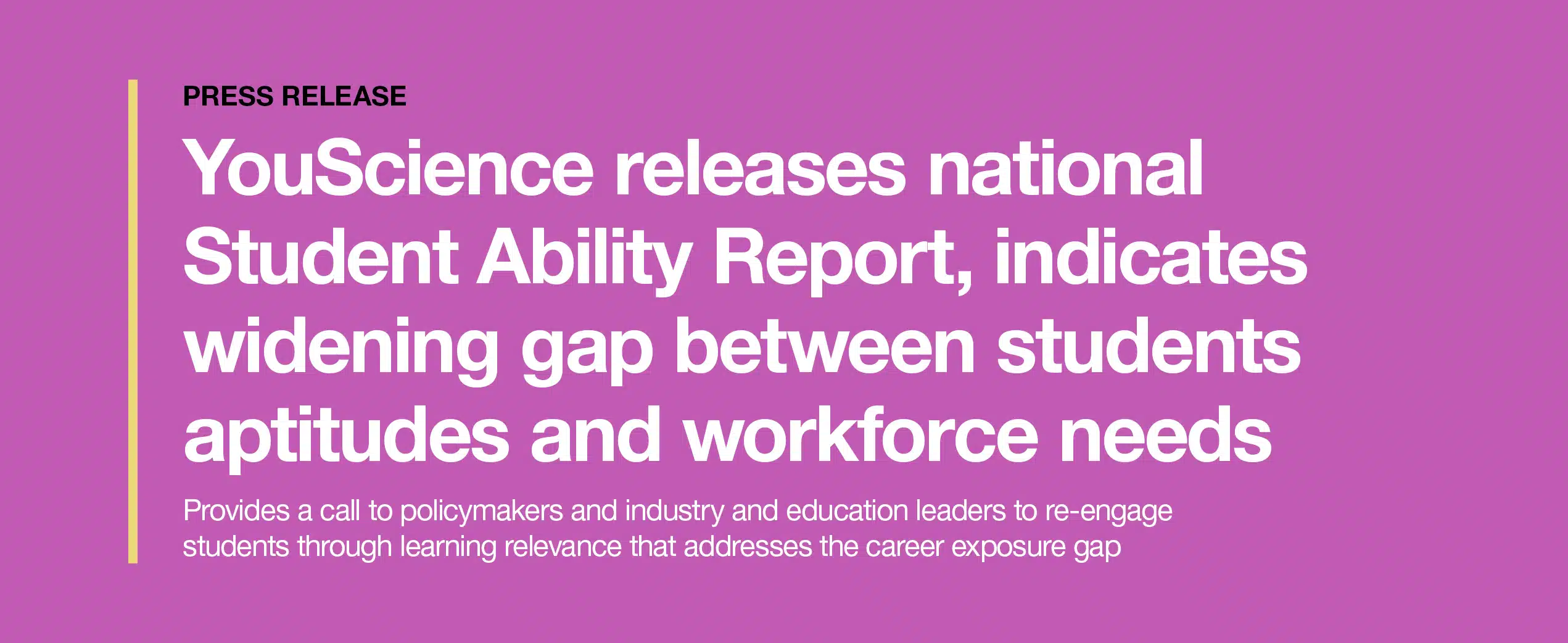Provides a call to policymakers and industry and education leaders to re-engage students through learning relevance that addresses the career exposure gape
AMERICAN FORK, UT, July 26, 2022 – YouScience, the leading student engagement platform that leverages data science to improve student success and bridge the divide between education and careers, today announced the release of a new national report, “State of The Future U.S. Workforce: Student Ability Report.” The findings reveal that students have the aptitudes, or talent, to excel in today’s in-demand jobs, but often lack interest in these fields, in some cases due to lack of knowledge about available careers. There is a critical need to address this career exposure gap. In doing so it can help engage students towards an educational pathway that results in career success.
The Report findings are an analysis of anonymized data from the YouScience Discovery aptitude assessment taken by 239,843 male and female U.S. high school students during the 2021 school year. The students represent all 50 states. YouScience Discovery uses psychometrically valid brain game-like exercises combined with an inventory of interests to uncover students’ aptitudes. Unlike interest-only surveys, aptitude assessments measure abilities, such as numerical reasoning, comprehension, spatial visualization, inductive reasoning, and sequential reasoning, to show how a person performs in given areas. Moreover, unlike interests, aptitudes don’t change and stabilize around age 14, according to research.
“This latest data paints a critical picture for industry and education: the skills gap is widening. And, it is widening at an increasingly rapid rate which impacts every aspect of our economy. Students must be better aligned to and prepared for the future needs of our workforce. We know students have the talent, but they are not being adequately exposed to the career pathways wherein they possess natural skills and where they have the most potential to thrive,” said Edson Barton, Founder and CEO of YouScience. “The good news is there is still time to close the gap and help all students become more engaged in their educational journeys and futures through early aptitude assessment and proper career guidance and exploration.”
The State of The Future U.S. Workforce: Student Ability Report shows that U.S. students’ aptitudes are greater than their interest in top national career clusters where significant job growth is forecast.
Key takeaways include:
- Students have nearly 5x the aptitude for energy careers than interest
- Students have more than 3x the aptitude for advanced manufacturing careers than interest
- Students have over 2x the aptitude for computer technology careers than interest
- Students have almost 2x the aptitude for health science careers than interest
The analysis also shows that biases still exist and need to be addressed in order to turn the corner on the exposure and skills gap challenges. For example:
- Female students have 30x the aptitude for energy careers than interest
- Female students have almost 4x the aptitude for computer technology careers than interest
- Female students have almost 10x the aptitude for advanced manufacturing careers than interest, while males have only 2x the aptitude than interest
- Male students have 2x the aptitude for health science careers than interest
o help students prepare for life after graduation, educators and administrators can strengthen their investment in work-based learning initiatives. They can do so by focusing resources on solutions and programs that ensure all learners understand their aptitudes and matching career opportunities, and engage in coursework and programs that build on these abilities and certifications.
YouScience offers the following recommendations:
- Help students find their “why:” When students discover their aptitudes, education becomes increasingly real and applicable. Aptitude assessments give both student and educator valuable insights and support for education and career learning. The assessment is best started in middle school or within the first two years of high school, so students can use their results to work with educators to make individual graduation plans.
- Close the exposure gap and reveal opportunities: Aptitude assessments connect aptitudes to best-fit career options that expand a student’s view of what is possible. This activates student engagement and creates opportunities to job shadow, explore short-term employment options, or attend job fairs and lectures. All these efforts help broaden students’ perspectives on career options.
- Make education more relevant using career-connected learning: Career and technical education (CTE) certifications are a powerful mechanism for helping students connect what they learn with real-world in-demand jobs. Students can explore best-fit career options and see what feels right or not.
- Enable connections between education and industry: Schools need to embrace local industries and invite them into the student learning experience to expand students’ opportunities. Work-based learning and career-connected learning bring industry into the classroom in tangible, targeted ways. These types of opportunities along with apprenticeships and internships, help students see and find their place in industry.
To learn more about YouScience and to download the full report, please visit: https://resources.youscience.com/hubfs/StudentAbilityReport-2022.pdf
About YouScience
YouScience is the only provider of a fully integrated platform that delivers highly accurate aptitude-based assessments, personalized career guidance, and industry-recognized certifications, empowering individuals in their educational and career pathways. Leveraging proven research and industry input, YouScience helps individuals identify their natural talents, validate their skills and knowledge, and get matched with real-world educational and career pathways in high-demand occupations. YouScience is the preferred choice of individuals, parents, educators, and counselors to guide and support educational and career pathways, currently serving more than 7,000 educational institutions and nearly one million users.

